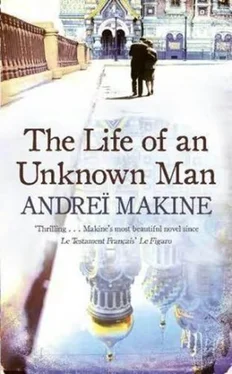Andreï Makine - The Life of an Unknown Man
Здесь есть возможность читать онлайн «Andreï Makine - The Life of an Unknown Man» весь текст электронной книги совершенно бесплатно (целиком полную версию без сокращений). В некоторых случаях можно слушать аудио, скачать через торрент в формате fb2 и присутствует краткое содержание. Жанр: Современная проза, на английском языке. Описание произведения, (предисловие) а так же отзывы посетителей доступны на портале библиотеки ЛибКат.
- Название:The Life of an Unknown Man
- Автор:
- Жанр:
- Год:неизвестен
- ISBN:нет данных
- Рейтинг книги:3 / 5. Голосов: 1
-
Избранное:Добавить в избранное
- Отзывы:
-
Ваша оценка:
- 60
- 1
- 2
- 3
- 4
- 5
The Life of an Unknown Man: краткое содержание, описание и аннотация
Предлагаем к чтению аннотацию, описание, краткое содержание или предисловие (зависит от того, что написал сам автор книги «The Life of an Unknown Man»). Если вы не нашли необходимую информацию о книге — напишите в комментариях, мы постараемся отыскать её.
The Life of an Unknown Man — читать онлайн бесплатно полную книгу (весь текст) целиком
Ниже представлен текст книги, разбитый по страницам. Система сохранения места последней прочитанной страницы, позволяет с удобством читать онлайн бесплатно книгу «The Life of an Unknown Man», без необходимости каждый раз заново искать на чём Вы остановились. Поставьте закладку, и сможете в любой момент перейти на страницу, на которой закончили чтение.
Интервал:
Закладка:
The next day, somewhat embarrassed, Léa had informed him that she must “pay a duty visit” to her mother. They set off together. This trip would mean more to Shutov than the year he had spent in New York, more than all his wanderings across Europe, more, even, than his time in Afghanistan on military service.
And yet it was just three days spent in an unpicturesque region to the north of the Ardennes. Cold, fog, hills covered in shivering woodland. And to crown the lack of tourist appeal, a faded billboard in the middle of a patch of wasteland announcing the imminent opening of a “sport center.”
He found himself back in a period he had never known, not being French, and fell a little in love with it. The designs on the paper lining the wardrobe in his hotel room were like those seen on the walls of houses under demolition. Before the mirror Shutov experienced vertigo: all those faces from bygone days superimposed on one another in the greenish reflection! He ran his hand over the top of the wardrobe (a place that harbors treasures abandoned by travelers). On this occasion the treasure was an ancient copy of the local newspaper, dated 16 May 1981…
Shutov read it while Léa had supper with her mother. He had been given leave not to show himself, to avoid introductions. “You see, the difference in our ages practically makes me a pedophile. On the other hand, if you insist, I could propose to your mother…” Léa had laughed, relieved. “That would kill me…”
They spent those three days going for walks, nestled close together under a big umbrella. Léa showed him her school, the little train station (closed years ago), and, in a loop in the river Sormonne, a grove where in her teens she used to come to write her first poems, believing that this activity called for an appropriately bucolic setting. Now, amid the winter squalls, the river was bleak, hostile. “Bizarrely,” thought Shutov, “this gray atmosphere is conducive to poetry,” and he saw an echo of the same conclusion reflected in Léa’s eyes.
On one of those evenings, wandering the streets alone, he walked into the Café de la Gare, opposite the disused station. The customers seemed to know one another so well that for a stranger their conversational exchanges, in fragments of allusive sentences, remained Delphic. An old man seated at the table next to him began speaking in a tone that, while not directly addressed to the intruder, implied a welcome. Shutov turned to him and, almost without his being aware of it, a conversation was struck up: the streets of the little town became peopled with characters at once humble and heroic. The hills awoke beneath the clash of arms, were covered in soldiers. Close to the bridge (“it was narrower in those days, they altered it after the war…”) infantrymen, their faces grimy with dust, were retreating, firing at the enemy. “We didn’t have much ammunition. We had to cut and run. The Fritzes had got very close. At least the ones spraying us had. Then it was night. We thought we could get to the forest. Well, we hoped we could… It was our machine gunner, a guy named Claude Baud, who saved us. He’d been hit in the leg but he went on firing. He was kneeling there in a pool of blood…”
Customers would come in and greet the man, speaking very loudly: “How’s it going, Henri? In good form, as ever?” The youths playing foosball would repeat: “How’s it going, Henri?” in mocking tones, whispering a rhyme, the sense of which was lost on Shutov. The man seemed to hear neither one lot nor the other. But he replied to Shutov’s questions without asking him to speak up. He even recognized his foreign accent, that r, an incorrigible giveaway… Léa came in, called out: “Hello, Henri. All right then?” and signaled to Shutov for them to go.
That night in his hotel room he thought again about the old man at the Café de la Gare. An ill-lit room, a window looking out over rusty tracks, words from a past that interests no one. He felt very close to this man, to the dreary houses in the little town and the hillsides plunged in frosty darkness. “I could live here. Yes, I could feel at home in this part of the world…” Confusedly, Léa must have sensed that for Shutov this trip would be a journey back to his true self.
The moonlight has moved away from the top-floor apartment in the building across the street. The moon hangs above the rooftops and blue brilliance floods the attic. Enough to read the titles of the books Léa has stacked up ready for her move. Titles that chart the chronology of his love for her. Their readings, their quarrels on the subject of a particular author… Then comes a swift demolition job, it all falls down, crash! He knocks over one of the piles, the volumes scatter on the floor. Which book were they talking about the day the first crack appeared? Maybe it was this collection of short stories. In one of them a woman was reunited with the man she had once loved and together they sped down a snowy slope on a toboggan… Ah, so during that trip to the Ardennes, he had seen himself as a Chekhovian lover. I love you, Nadenka…
Three o’clock in the morning, the day has arrived when Léa will come to collect her cardboard boxes, the remnants of her life in Shutov’s life. After she has left he will go on talking to himself, a little like the old man at the Café de la Gare.
He realizes he has never said anything to Léa that was vitally important. Has not dared, has not known how to. He has wasted so many days (miraculous days, days made for love) proclaiming the poet’s sacred mission, railing against the intellectual establishment. At first she used to listen to him with the reverence prophets enjoy. Literary Paris fascinated her and Shutov seemed like a very well-established writer. The illusion lasted less than a year. The time it took for a young woman from the provinces to get her bearings and realize that this man was, in fact, no more than a marginal figure. And even his past as a dissident, which in the old days had given Shutov a certain aura, was becoming a flaw, or at least a sign of how prehistoric he was: just think, a dissident from the eighties of the previous century, an opposition figure exiled from a country that had since been erased from all the maps! “The early eighties, the time when I was a baby,” Léa must have told herself. Now her affection became tinged with pity. She sought to extricate Shutov from his isolation. And this was the start of a war neither could win.
“We’re not in the nineteenth century now!” she would argue. “Books are a product like any other… Well, because they’re for sale, of course! All right, go ahead. Do what Bulgakov did. Write to be published thirty years from now. After you’re dead.”
Shutov would grow heated, give examples of writers who had been rediscovered: Nietzsche, and those forty copies of Thus Spake Zarathustra published at the author’s expense and given to his friends.
“Fine. Give me your manuscript and in an hour I’ll come back with forty copies. You can sign the first one for your Australian neighbor, and he’ll wedge open his skylight with it. You’ve got the wrong period, Ivan! These days the most popular man in France is a footballer, not a poet…”
“In some countries that period survives!”
“Really? In Outer Manchuria, I suppose.”
“No. In Russia…”
These duels had an indirect consequence: Shutov began to dream of the Russia he had not seen for twenty years and where, he believed, a life persisted, rocked to sleep by well-loved lines of verse. A park beneath golden foliage, a woman walking in silence, like the heroine of a poem.
That image of a skylight wedged open with a manuscript was a milestone. He sensed a certain arrogance in Léa, that pert humor, known as gouaille , so relished by the French (he had never understood why). She began spending time away often, on the pretext of her journalism classes or interning at a publisher.
Читать дальшеИнтервал:
Закладка:
Похожие книги на «The Life of an Unknown Man»
Представляем Вашему вниманию похожие книги на «The Life of an Unknown Man» списком для выбора. Мы отобрали схожую по названию и смыслу литературу в надежде предоставить читателям больше вариантов отыскать новые, интересные, ещё непрочитанные произведения.
Обсуждение, отзывы о книге «The Life of an Unknown Man» и просто собственные мнения читателей. Оставьте ваши комментарии, напишите, что Вы думаете о произведении, его смысле или главных героях. Укажите что конкретно понравилось, а что нет, и почему Вы так считаете.









